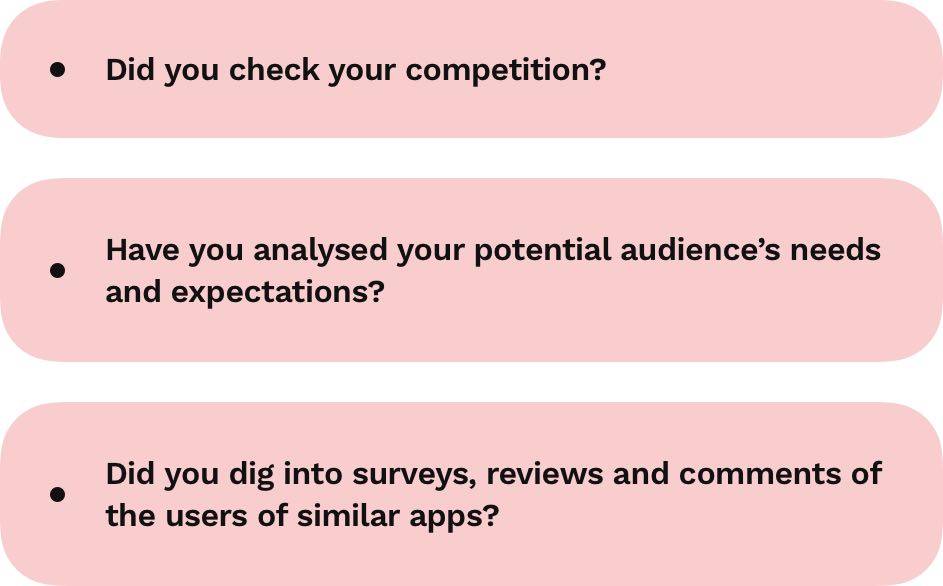
5 common mistakes when creating MVP and how to avoid them
MVP is a Minimum Viable Product — a functional application but only with a minimum and absolutely essential set of features. Why is creating a minimum viable product for your business a good idea? It’s mostly because of cost-cutting. There’s also the possibility of checking the market’s needs before releasing the full version of the app. Building a complex mobile app requires investing quite a lot. You can find more about cost-cutting and advantages of MVPs in this article. MVP is kind of a trimmed-down version but it doesn’t mean it has any deficiencies or that it’s not functional. The product is supposed to work for as many users as you need. Its main purpose is to check the viability of the idea and to test its main features. In this article you’ll find some basics concerning the preparation for the MVP development. But most importantly, you’ll get to know common mistakes when creating MVP and you’ll learn how to avoid them.
Contents
Ignoring the analyses and research
If you’re thinking about implementing your minimum viable product, answer the following questions first:

Answering these questions is very important because
- Knowing the competition will simply help you avoid the risk of losing — releasing a very similar app to one already existing is very risky. You might have to spend a lot of money for mobile marketing later to become profitable because of the large competition
- Understanding the potential users is essential to meet their expectations — make some effort to check their feedback on apps that work in the same areas. Use different methods to read their comments, see what they lack, what they’d like to change, what annoys them and what they like.
An important question before you start building a minimum viable product
Does anyone need your product?
That’s right. Most of the ideas fail at the start because there is no market need for them. That’s why these analyses are so crucial. You have to check if your idea has any chance to become popular in the first place. Because if there is no need for this kind of product, it doesn’t matter if the app is very functional. It doesn’t matter if it’s the most beautiful one in the world — nobody will download it.
So, how important are the analyses?

Who’s there to reach out to you
Remember that an experienced software house will always be able to help you with this. That’s something they’ve done many times. This makes them capable of giving advice and helping also on the stage of checking the competition and future users.
Don’t ignore these steps. Also, have in mind that the analysis process includes the subsequent arrangements concerning features and design of your mobile app. But this is for later.
To sum up, the advice you should follow is: choose your strategy. You can also check some mobile apps or websites for product-market testing in order to find your path for this strategy. Try to collect the maximum amount of valuable feedback from the team and from anyone involved in your business to find a way to satisfy your customers. The time spent on analyses will pay off.
Choosing the wrong software house for your project
One serious and quite common mistake is choosing the wrong mobile app development company for the project. It doesn’t mean that a lot of companies are weak or unprofessional (although there exist some). The world isn’t divided into the good and the bad mobile app development companies — different agencies use different technologies and have various numbers of employees who have particular knowledge and are able to proceed with particular solutions. The aim is to find the one that fits your requirements. How to do it?
While looking for a software house for your project remember about those bullet points
- Dig into case studies — check if the company has the experience needed to deliver your solution. Sometimes it turns out that a particular company has done something similar to your idea, so it might be easier for them to proceed with your project. You can check out our case studies here
- Read the reviews on different platforms — look for them on sites showing the rankings of the best mobile app development companies, filtering searches by your requirements
- Don’t focus too much on location — nowadays these services can be carried out entirely remotely. More importantly, the agency should understand your business model, which doesn’t depend on your or their location
- Don’t focus only on the price — not that it’s not important, but targeting only on the low price will bring you to a poor quality product
- Do focus on communication. If the communication is bad at the beginning, be aware that it probably won’t get any better then. And communication is the key to success in mobile app development. More about the meaning of communication here.

Experience is the key
Going back to the first bullet point, experience is the most important and crucial thing in this compilation. It determines whether a company will be able to deliver the project in an effective and satisfactory manner.
An MVP built by professionals can be developed later in an efficient way, for example if you decide to add more features, change the designs slightly or serve more users. So the same principles apply when choosing a company when you want to develop your app (Hints for further MVP development).
Choosing the wrong technology for the development
Sometimes it happens that the choice of technology is made at the wrong moment. You should make the decision after finishing the designs. That’s how developers will be able to assess which technology would fit best for this particular project.
And when it comes to designs, a very important rule to follow is to build wireframes and prototypes before starting the development. You can read more about it here. Overall, let one stage be finished before you proceed with the next one.
Predicting the number of users
The choice of technology should also be done in terms of the number of users, so you ought to think about the popularity of your product. Of course, it's hard to determine how many users an app will have before it’s released and put on mobile stores, but that's what analysis is all about. You should try to estimate how big the demand for a given product is. That’s how you’ll get to know whether the app should serve about a hundred or closer to a thousand people, or maybe even more.
This is what the choice of technology depends on, among other things. If you assume that the product would be useful for at most a few hundred users, and it turns out that there might be much more, you may make a mistake with this choice.
This is where positive thinking comes in handy — it's better to expect that your app will have more users than you estimated initially.
Forgetting about the purpose of MVP
The most important thing about the minimum viable product is to check its viability and performance as soon as possible. This is what the minimum set of features is for. Find out if the app fulfils its purpose before you think about developing it.
At the same time, you should keep the future of your product in mind. So let’s say that your minimum viable product has proved to be functional and viable. What’s next?
If you decide to develop it further, you’ll have to invest. So it’s better when you’re completely sure that this action will be profitable. Try to think ahead and promote your app so that its performance isn’t only dependent on users’ recommendations and a stroke of luck.
Promotion and marketing

Don't count on the product to promote itself. Even the best solutions can’t be sold without your effort. Some people think that there’s no need to promote an app that is great and users will just download it just because someone else will recommend it. It’s true that recommendation is one of the best ways of promotion, but it’s still not enough. Most of the apps from mobile stores are getting downloaded thanks to mobile marketing. Users want to try it not because it’s something they need, but because they liked an advertisement on Instagram or Facebook and so on.
Sometimes these ads even make an impression that the app is serious, kind of professional. Imagine yourself looking for, as an example, a mobile app for chatting. You’ll probably put something like “best chat mobile apps” in Google. Or, you’ll ask your friends and you’ll try out the one of which you had heard of before. You’ll never download the one you don’t know at all. And that’s the power of ads. The fact that you’ve seen or heard something about this particular product before makes you think that it’s better than the one you didn’t know about.
If you want to learn some hints about further MVP development, this article will be perfect for you.
And to know more about MVPs themselves, check out MVP — what is it and why is it important?.






